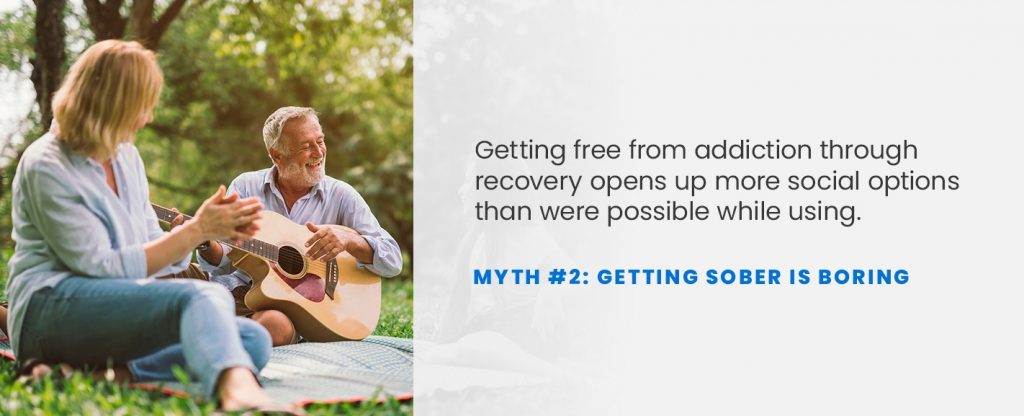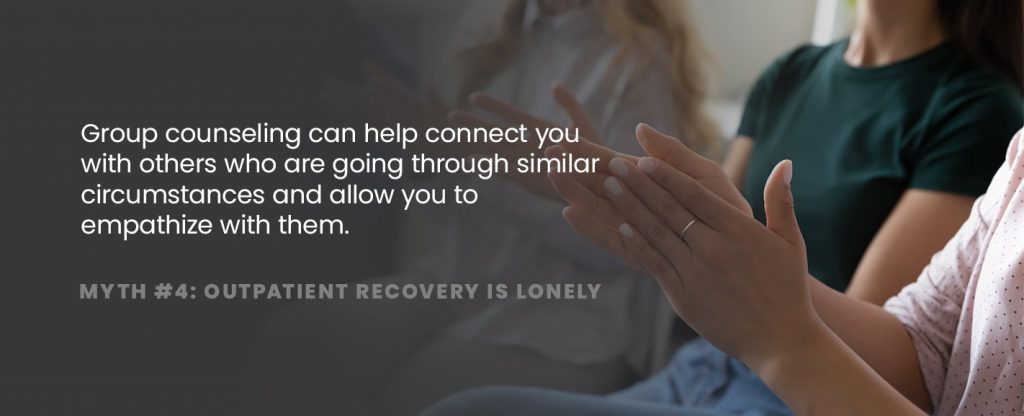
Common fallacies about recovery could be preventing people from getting help.
There are so many stubborn misconceptions about substance use recovery that it can feel impossible to differentiate fact from fiction. Knowing the truth behind these mistaken beliefs can help those struggling with substance use disorder understand their recovery options.
If you or a loved one are hoping to get on the road to recovery, keep reading. To help clear up your perception of substance abuse treatment, look at these top six myths about recovery.
Myth #1: Hitting Rock Bottom is Necessary
One of the most persistent fallacies surrounding addiction recovery is that you must hit rock bottom before getting help. However, the opposite is true. Getting treatment sooner rather than later is a preventive measure. It can help people avoid reaching the lowest of low points.
There’s no need to wait until your life is in pieces to break the vicious cycle of addiction. Various recovery treatments are always available for people dealing with different stages of their illness.
Some people have hit rock bottom before realizing they need professional help. However, it’s better to start looking into recovery options before it happens. It can get you started on the road to sobriety and save you from losing the things you hold dear.
Myth #2: Getting Sober Is Boring

Many people worry that they will have to lose their social life when they get sober. That couldn’t be further from the truth! Social substance use can seem fun because it often works as a Band-Aid to cover up underlying anxiety issues.
However, it doesn’t provide lasting social connections. Over time, those struggling with addiction tend to erode their relationships and end up feeling more isolated than ever.
Breaking free from addiction through recovery opens up more social options than were possible while using. By freeing up the time you spent feeding your addiction, you’ll be able to fill your life with meaningful experiences.
You will spend time with genuine friends and make new ones along the way. You can be more present with others and have substance-free fun that you will remember in the morning.
Myth #3: Medication-Assisted Treatment is Less Effective
Medication-assisted treatment (MAT) is equally as valid as a recovery plan as any other form of substance use treatment. Some medications can help you abstain from illicit drugs and ease some of the effects of cravings and withdrawal. By helping you stay physically comfortable, MAT allows you to focus more on the mental work that accompanies recovery.
Specifically, buprenorphine treatment helps to reduce the unpleasant side effects of opioid withdrawal. By attaching to the same receptors in the brain as opioids do, buprenorphine can keep the body at a comfortable level. Unlike misused opioids, buprenorphine doesn’t create a “high,” making it an effective recovery medication.
Myth #4: Outpatient Recovery Is Lonely

People enrolled in outpatient treatment do not live on a campus with fellow patients. That doesn’t mean outpatient recovery is lonely! A well-rounded outpatient treatment plan includes regular counseling sessions, both individual and group. Paired with MAT, outpatient treatment counseling provides the necessary support to overcome cravings and remain sober.
Though it is not a common discussion topic, more than 35 percent of Americans report having a substance misuse problem. This means no one is alone in their recovery process.
Group counseling can help connect you with others who are going through similar circumstances and allow you to empathize together. Ditch the secrecy, shame and self-isolation involved with addiction. Outpatient recovery and counseling will give you a sense of community, support and freedom.
Myth #5: Experiencing a Relapse Means You Have Failed at Recovery
Because recovery is a process, between 40 to 60 percent of those battling substance abuse disorder relapse at some point.
However, relapse is just a speedbump on the road to recovery, not a stop sign. As humans, we make mistakes, so a return to substance misuse is not an uncommon part of the journey. Far more crucial than whether you relapse is what you do afterward.
Though an incident of relapse can be discouraging, it creates an opportunity to reevaluate. It also calls for strengthened relapse prevention. Meetings with a counselor and trusted recovery pal are in order to get back on track.
Myth #6: You Will Always Struggle With Resisting Substance Use
The path to complete recovery can be a long road. You will reach a point at which you can go days, weeks or even months without thinking about using.
By going through treatment, you begin replacing self-destructive behaviors with positive habits. You will become so focused on living life to the fullest that using again won’t cross your mind.
Becoming content with a life free of substance misuse is hard-earned but worth it. The new and improved sober version of yourself will never want to go back to the way things were. To help you reach this point faster, it helps to join substance-free activities. Recovery community sports team and new hobbies are the perfect way to occupy your time.
Medication-Assisted Treatment with AppleGate Recovery
These six recovery myths instill people with a fear that drives them away from treatment before giving recovery a shot. Contrary to these fallacies, you can seek help at any point during active addiction.
Achieving recovery will not make you dull or lonely. MAT is an effective recovery treatment! Relapse does not mean you’ve failed.
You can conquer substance use disorder once and for all. But to do so, you need to take the first steps to recovery.
Don’t let lies and doubts keep you from making the potentially lifesaving decision to start substance use treatment. Contact AppleGate Recovery to learn more about how MAT and counseling can help you get started.
Outpatient treatment with AppleGate allows clients to continue their everyday lives outside treatment and maintain their regular schedules and responsibilities. We treat people with dignity and respect, always making confidentiality a top priority.
At AppleGate Recovery, there’s no waiting list. Find the treatment location nearest you and schedule a visit or appointment today.
